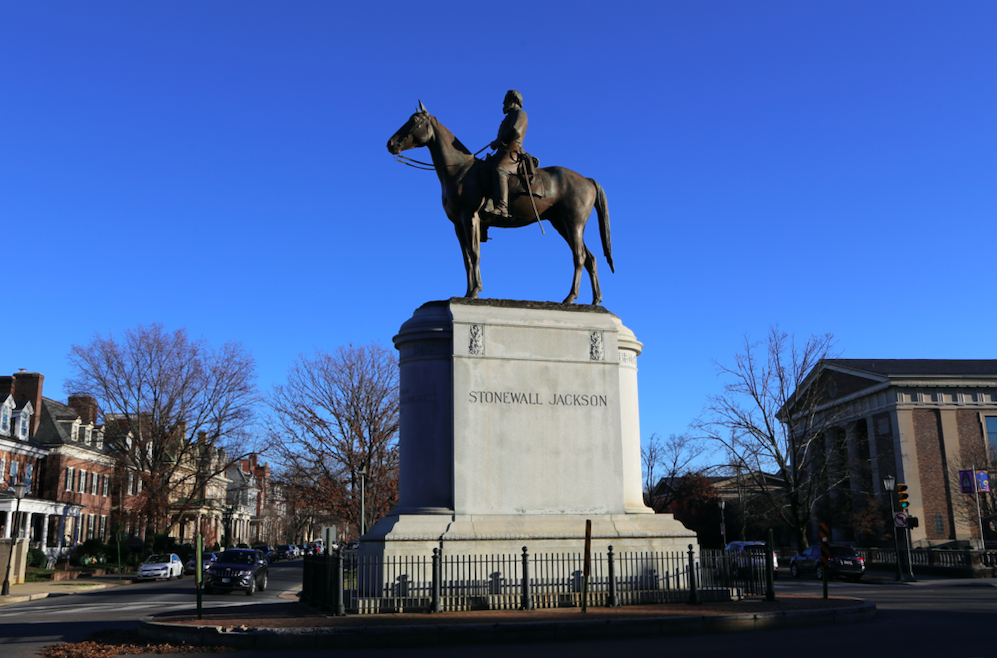RICHMOND, Va. (CN) — NAACP Virginia State Conference filed suit Tuesday accusing a school board that voted to restore Confederate names of discriminating against Black students.
"My belief is the Shenandoah County School Board reaffirmed their commitment to White supremacy and the celebration of a race-based rebellion against the United States of America with their vote to name public schools after military leaders of the Confederate States of America," Virginia NAACP President Rev. Cozy Bailey said in a statement.
The National Association for the Advancement of Colored People and five students accuse the Shenandoah County School Board of endorsing a discriminatory and harmful message of Black inferiority and subjugation. The suit claims requiring Black students to attend schools named in honor of prominent members of the Confederacy and compelling them to identify as members of the Stonewall Jackson "Generals" violates their rights.
The school system, located in the northwestern area of Virginia, made national headlines on May 10 when it voted 5-1 to restore the Confederate namesakes of two schools. The renaming of Mountain View High School and Honey Run Elementary School to their prior names, Stonewall Jackson High School and Ashby Lee Elementary School, is believed to be the first renaming of its kind.
"When students walk through the halls of renamed Stonewall Jackson High School and Ashby Lee Elementary School, they will do so with inescapable reminders of Confederate legacies that enslaved and discriminated against African-descended people," Bailey said. "This community deserves better."
In a 5-1 vote the school system, like many in the South, agreed to retire the Confederate school's names in 2020 following a summer of civil unrest spurred by the police killing of George Floyd. Community members immediately began campaigning for school board seats on the promise of restoring the names.
The six members of the school board who voted in May were Chairman Dennis Barlow, Vice Chairmen Kyle L. Gutshall and Thomas A. B. Streett, Gloria E. Carlineo, Brandi K. Rutz and Michael D. Rickard. Gutshall was the only member who voted against the motion. None of the six had been board members at the time of the July 9, 2020, vote to retire the Confederate school names.
Members tried to change the names back in 2022, but with a 3-3 vote, the school board didn't pass the motion. Black students make up less than 3% of the students enrolled in Shenandoah County public schools.
The First Amendment claim relies on the right not to express a view with which a person disagrees.
"By reinstating the Confederate school names and requiring students participating in school activities and in extracurricular activities to wear uniforms or use other apparel while participating as a member of the Stonewall Jackson 'Generals,' defendant is compelling individual plaintiffs and members of the NAACP to express a view with which they disagree," the NAACP wrote in the complaint.
The equal protection clause of the 14th Amendment prohibits states and state actors from discriminating based on race or national origin. The NAACP claims the decision to restore the original Confederate names was motivated by a discriminatory intent or purpose.
The NAACP seeks an injunctive relief requiring the removal of the Confederate names and mascots and to prevent any future naming involving Confederate leaders or references to the Confederacy.
The group emphasizes the names' origins as remnants of Massive Resistance. After the Supreme Court's 1954 ruling in Brown v. Board of Education, finding U.S. state laws establishing racial segregation in public schools unconstitutional, U.S. Senator Harry F. Byrd Sr. of Virginia and his son's brother-in-law, James M. Thomson, implemented the Massive Resistance policy in 1956.
"The aim of that resistance was to maintain segregation and the invidious system of White supremacy undergirding it," the group wrote.
In 1958, in response to a federal court order requiring the integration of various schools in Virginia, Governor J. Lindsay Almond ordered schools in several counties to be closed to avoid integration. Eight years after Brown, Virginia schools remained 99% segregated.
In the 1950s, Shenandoah County received $500,000 from the General Assembly to build three high schools to serve white students. During the same period, the school system named an elementary school in honor of Stonewall Jackson. The school was renamed in 1975 to honor Turner Ashby and Robert E. Lee.
"The Confederacy and its leadership are inextricably intertwined with the history of slavery in America and continue to be symbols of racial oppression and hatred," the attorneys wrote.
Black students were not permitted to enroll in Stonewall Jackson High School and were bused to high schools in Harrisonburg and Winchester. Following an effort by the NAACP, the first Black students enrolled in the school for the 1963–1964 school year.
The school board's next meeting is slated for June 13. Representatives from the board have yet to respond to a request for comments.
"By voting for Confederate names, the school board is subjecting children to discrimination," Marja Plater, senior counsel at the Washington Lawyers' Committee for Civil Rights and Urban Affairs, said in a statement. "Exposing children to this persistent racism and hate harms their self-worth and long-term health."
Subscribe to Closing Arguments
Sign up for new weekly newsletter Closing Arguments to get the latest about ongoing trials, major litigation and hot cases and rulings in courthouses around the U.S. and the world.









